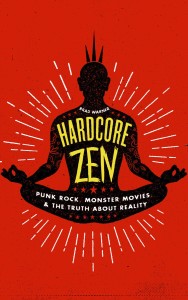The title of this page is not meant to imply that I think every book about Zen other than those listed on this page sucks. This is just a short and incomplete list of books on Zen that I know for myself do not suck. There are a number of books I haven’t read that I’m pretty sure are great because of what people tell me about them or what I know about their authors – Opening the Hand of Thought by Kosho Uchiyama, for example or Seung Sahn’s Only Don’t Know. But I didn’t want to list anything I have not personally read. I’m also not listing some great non-Zen books such as Commentaries on Living by J. Krishnamurti. I’ll probably add to this list, so check back some time.
EASY BOOKS
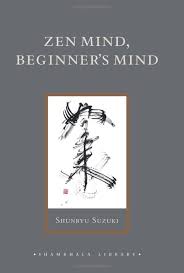 TO MEET THE REAL DRAGON by Gudo Wafu Nishijima. This is a collection of talks given by my teacher Gudo Nishijima a few years before I encountered him. An American student of his revised the transcripts in much the same way that the transcripts of Suzuki’s talks were revised for Zen Mind Beginner’s Mind. Nishijima oversaw the project and approved of the results. It’s a great little introduction to Nishijima’s unique style.
TO MEET THE REAL DRAGON by Gudo Wafu Nishijima. This is a collection of talks given by my teacher Gudo Nishijima a few years before I encountered him. An American student of his revised the transcripts in much the same way that the transcripts of Suzuki’s talks were revised for Zen Mind Beginner’s Mind. Nishijima oversaw the project and approved of the results. It’s a great little introduction to Nishijima’s unique style.
SHORT WORKS BY GUDO NISHIJIMA This isn’t really a specific book. But several of Nishijima Roshi’s shorter works in English are available in PDF form from the Dogen Sangha website. These include his short pamphlet about the Buddhist Precepts, a pamphlet called Three Philosophies One Reality, which lays out his favorite philosophical theory in great detail, Understanding the Shobogenzo, which is exactly what it sounds like, Japanese Buddhism and the Meiji Restoration, which is far more interesting than the title suggests, Zazen: A Better Way of Experiencing Pain, a collection of lectures on the phenomenon of pain, Buddhism and the Autonomic Nervous System, another of his favorite theories, 30 Questions and Answers About Buddhism, which is very, very, very good, How to Practice Zazen, a nice short introduction, and some other collected lectures.
ZEN MIND BEGINNER’S MIND by Shunryu Suzuki. This was the first Zen book I ever read. It’s still one of my favorites. The chapters are short and straightforward. You don’t need a degree in Asian studies or philosophy to follow along. This book created from transcripts of talks Suzuki gave in a garage in Palo Alto in the Sixties. I’ve seen the original transcripts and these versions are much more readable. Also recommended by the same author Not Always So, Branching Streams Flow in Darkness, Zen is Right Here
EMBRACING MIND: THE ZEN TALKS OF KOBUN CHINO OTOGAWA edited by Judy Cosgrove and Shinbo Joseph Hall. Kobun Chino Otogawa was my first Zen teacher’s teacher. I never met him. But I feel like much of the way I understand Zen comes from the way Kobun taught it to Tim. It’s great to finally have some of Kobun’s lectures collected in written form. This is an amazing book.
EACH MOMENT IS THE UNIVERSE by Dainin Katagiri. Like Suzuki’s books, this was created from transcripts of talks the late Katagiri Roshi gave at Minneapolis Zen Center. It’s quite similar to Suzuki’s books, meaning it’s not very technical. He just delivers straight talk about Zen practice and life. Katagiri and Suzuki were good friends. Also recommended by the same author Returning to Silence, You Have to Say Something
LIVING BY VOW by Shohaku Okumura. A great book about the various vows we make in Zen as well as some of the ceremonial stuff we do. Okumura’s work is a bit more scholarly and slightly more technical than Suzuki’s or Katagiri’s, but it’s also similar in its warmth and directness. Unlike Suzuki or Katagiri, Okumura actually writes his own stuff rather than having his students turn transcribed talks into books. So his books better represent what he is actually trying to say. Also recommended by the same author Realizing Genjo Koan
EVERYDAY ZEN by Charlotte Joko Beck. I haven’t read this book in at least twenty years, so my memory of it may not be completely reliable. But I remember thinking it was one of the clearest Zen books I’d ever read. Also recommended by the same author Nothing Special
SINGLE WHITE MONK by Shozan Jack Haubner. This is one of the most real books about Zen practice ever written. Haubner was a monk at Mt. Baldy Zen Center where Leonard Cohen was also a monk. In this book he gets into the gritty details of contemporary Western Zen monastic life. He also deals frankly and honestly with the sex scandal that raged around the head teacher of his monastery. Harrowing stuff but also funny and entertaining. Also recommended by the same author, Zen Confidential.
DISCOVERING THE TRUE SELF by Kodo Sawaki. Kodo Sawaki was one of my teacher Nishijima Roshi’s teachers. Arthur Braverman wrote an engaging biography of Sawaki and paired it with some of Sawaki’s best teachings. This is one of the best Zen books there is and also one of the easiest ones to read!
THE ZEN TEACHINGS OF HOMELESS KODO by Kodo Sawaki and Kosho Uchiyama with Shohaku Okumura. Kodo Sawaki was Gudo Nishijima’s main teacher. He was also very influential to Shunryu Suzuki and Dainin Katagiri and, thus, indirectly highly influential on American Zen as a whole. This is one of the few books available in English of his extensive writings. It’s a great little compilation and I hope more of this material will become available in English soon. (See Commentary on the Song of Awakening below).
BLOOD SOAKED BUDDHA/HARD EARTH PASCAL by Noah Cicero. This is a short and very personal reflection on Buddhism and existentialist philosophy by a young Ohio-born poet. It’s not exactly a Zen book in terms of being something written by a monk or ordained teacher, rather, it’s a sincere account of one person’s lifelong interest in Buddhist philosophy. I liked it so much I wrote the foreword.
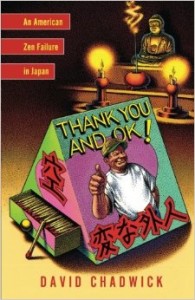 THANK YOU AND OK! By David Chadwick. The subtitle of this book is “An American Zen Failure in Japan.” That tells you pretty much what kind of book this is. Chadwick was one of Shunryu Suzuki’s earliest students and he remains one of the most sincere and least pretentious of the bunch. Of all the students of Suzuki I’ve met, Chadwick is the only one I’ve ever been able to have a real conversation with. Also recommended by the same author Crooked Cucumber (a biography of Shunryu Suzuki)
THANK YOU AND OK! By David Chadwick. The subtitle of this book is “An American Zen Failure in Japan.” That tells you pretty much what kind of book this is. Chadwick was one of Shunryu Suzuki’s earliest students and he remains one of the most sincere and least pretentious of the bunch. Of all the students of Suzuki I’ve met, Chadwick is the only one I’ve ever been able to have a real conversation with. Also recommended by the same author Crooked Cucumber (a biography of Shunryu Suzuki)
CONFESSIONS OF A BUDDHIST ATHEIST by Stephen Batchelor. A travelogue about the life of Gautama Buddha along with ruminations on what it means to be a Buddhist in the 21st century. Batchelor travels the roads that Gautama Buddha himself traveled in order to gain a unique insight into the real life of the real person who started Buddhism. Also recommended by the same author Buddhism Without Beliefs, The Awakening of the West, After Buddhism.
THIS IS IT by Alan Watts. It took me a long time to finally read anything by Alan Watts. When I started studying Zen it seemed like the only books on the subject I could find were by DT Suzuki and Alan Watts. DT Suzuki was way too scholarly for me and Watts just seemed like a druggy hippie. I finally read the title essay from this collection around 2009 and was amazed. Watts was really good. I’m still not so sure about DT Suzuki.
ASKING ABOUT ZEN: 108 ANSWERS by Jiho Sargent. A short concise introduction to Zen philosophy and practice by an American woman Zen master who lived and taught in Tokyo, Japan for decades. I never got to meet Jiho, but I really enjoyed her book.
BUDDHISM IS NOT WHAT YOU THINK by Steve Hagen. Another short, concise introduction to Buddhist practice and philosophy by a Minneapolis based teacher in the lineage of Danin Katagiri. We once ate Thai food together. Also recommended by the same author Buddhism Plain and Simple and The Grand Delusion and Why the World Doesn’t Seem to Make Sense.
BUDDHAS BEHIND BARS by Rev. Tonen O’Connor. A collection of stories from a Zen prison outreach project conducted by Rev. Tonen O’Connor of the Milwaukee Zen Center. Sometimes a harrowing read, but invaluable.
BUDDHA IS THE CENTER OF GRAVITY by Joshu Sasaki. I didn’t list this on the earlier version of this page because it was impossible to find at a reasonable price. But now someone has put up a PDF, which I’ve linked to. Sasaki’s reputation is kind of in the gutter these days. You can read all about this in Shozan Jack Haubner’s Single White Monk (link above) or just search Sasaki’s name online. I believe that pieces of art are very often far better than their creators. This book may be a great example. It’s a genuinely enlightened piece of writing and I still really like it, in spite of some of the things I’ve heard about the man who wrote it.
HARDER BOOKS
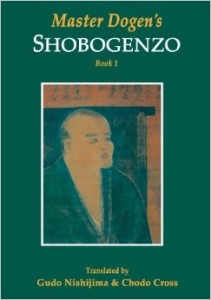 SHOBOGENZO by Dogen. This is Dogen’s masterwork and, for my money, the best and clearest writing about Zen ever produced. But it’s very old and very technical. Dogen was a smart guy and extremely well-read. It’s difficult to keep up with all his literary allusions and references. Luckily, my teacher Gudo Wafo Nishijima along with his student Mike Cross put together a highly annotated translation that tracks all of these references for you and explains what most of them mean. Kazukai Tanahashi and the folks from San Francisco Zen Center put together their own translation, which is much easier to read than Nishijima’s but tends to take more liberties in its translation.
SHOBOGENZO by Dogen. This is Dogen’s masterwork and, for my money, the best and clearest writing about Zen ever produced. But it’s very old and very technical. Dogen was a smart guy and extremely well-read. It’s difficult to keep up with all his literary allusions and references. Luckily, my teacher Gudo Wafo Nishijima along with his student Mike Cross put together a highly annotated translation that tracks all of these references for you and explains what most of them mean. Kazukai Tanahashi and the folks from San Francisco Zen Center put together their own translation, which is much easier to read than Nishijima’s but tends to take more liberties in its translation.
DOGEN: TEXTUAL AND HISTORICAL STUDIES edited by Steven Heine. A very good compilation of the latest research about Dogen Zenji, the author of Shobogenzo and founder of Soto style Zen Buddhism in Japan. Heine is a respected scholar and all of his books about Dogen are worth investigating.
DOGEN’S MANUALS OF ZEN MEDITATION by Carl Bielefeldt. This is evidently the only full-length book currently available from one of the best Dogen scholars around. Bielefeldt is one of the few Dogen scholars I ever heard my teacher Gudo Nishijima say nice things about. This book goes into almost ridiculous detail about the origins of his famous piece Fukan Zazengi (Recommending Zazen to All People).
COMMENTARY ON THE SONG OF AWAKENING by Kodo Sawaki, translated by Tonen O’Connor. Kodo Sawaki wrote a number of books in Japanese, the most famous of which is called Zen and Satori. This is the only one of Sawaki’s books currently available in English. It was translated by Tonen O’Connor, retired abbot of the Milwaukee Zen Center, from the French edition. She consulted with the estate of Kodo Sawaki to make sure her English version matched the original Japanese as closely as possible. This is not an easy book, but it gives great insight into Sawaki’s ideas about Zen Buddhism.
GOTAMA BUDDHA by Hajime Nakamura. Amazon now lists this book, which was published just fourteen years ago, at over $900. That’s a ridiculous price and no one should ever buy it for that much. Once it goes back to a normal price, I highly recommend it. This is probably the most reliable book you’ll ever find about the man who started it all, our good friend Mr. Buddha. It’s not an easy read, but Nakamura is extremely thorough and his scholarship is first rate. Also recommended by the same author Gotama Buddha Vol. 2
THE HISTORICAL BUDDHA by H.W. Schumann. This is almost as good as Nakamura’s book but much shorter and easier to read. Plus it still sells for a reasonable price. Another historical overview of the guy who started it all.
FUNDAMENTAL WISDOM OF THE MIDDLE WAY by Gudo Wafu Nishijima (with Brad Warner). Nishijima Roshi spent the last years of his life attempting to produce the definitive English translation of Nagarjuna’s 2nd Century CE classic Fundamental Wisdom of the Middle Way. I helped him turn his idiosyncratic prose into standard English. I do not claim that this is the definitive translation of Nagarjuna’s masterwork. It is certainly nothing like the standard translations. Even so, I do believe it is an extremely worthwhile and valuable book on its own. I wish I’d been able to convince Nishijima to issue it as his reflections on Nagarjuna’s work rather than as a translation of it. If he would have, the book would not have taken the highly undeserved and ridiculously over-emotional critical beating it did. Buddhist scholars can be very nasty and extraordinarily petty, including the authors of other Nagarjuna translations. Sad!
MY BOOKS
LETTERS TO A DEAD FRIEND ABOUT ZEN My latest book was written as a series of letters written to my friend Marky who died of cancer a few years ago. I had known Marky since high school, and we had even shared a house together, yet I had never spoken to him in detail about Zen practice. In this book, I wrote all the things I wanted him to know about this crazy weird practice that I have devoted most of my life to. In a sense, it’s a continuation of Hardcore Zen in that it is intended to explain the basics of Zen practice and philosophy to someone who is very new to them. Also available as an audiobook.
DON’T BE A JERK In this book I rewrote several of Dogen’s 800 year-old essays on Zen practice in my own words. Even though there are several excellent English translations of Dogen’s works, they tend to be written for academics or for people already steeped in the deep study of ancient Asian philosophy. But Dogen wasn’t writing for people like that. He was writing for anyone interested in looking fearlessly at what life is really all about. I’ve tried to bring that back by making Dogen’s ideas more accessible to contemporary readers without dumbing them down. NPR liked it! Also available as an audiobook.
IT CAME FROM BEYOND ZEN This is a continuation of Don’t Be a Jerk (DBAJ). I think it’s a little better than DBAJ in the sense that I applied what I learned in writing DBAJ to the essays I looked at in It Came From Beyond Zen. Also available as an audiobook.
HARDCORE ZEN The book that started my career had its origins as a website, which has long ago disappeared, and as a kind of long letter to my then 14 year old nephew Ben. Wisdom Publications heavily edited my original prose, making me sound like a raging punk teenager at times. But it’s still OK. It’s a basic overview of Dogen-style Zen Buddhism. Everybody seems to love the chapter on the Heart Sutra. Also available as an audiobook.
SIT DOWN AND SHUT UP! This book goes much more into detail about Dogen’s philosophy. I tried to present what I understood of Shobogenzo from my study of it under the guidance of Gudo Nishijima. There’s now an on-line index of where the various quotations from Shobogenzo can be found. Also available as an audiobook.
ZEN WRAPPED IN KARMA DIPPED IN CHOCOLATE This is my most important book and, as you might expect, the poorest seller of them all. It’s about how all this Zen mysticism fits in with the real world in the 21st century. It focuses on my own 2007 when my mom and my grandmother died, my wife left me, and I lost my job, all while I was traveling around the country trying to be Mr. Zen Master for the people who needed me to be that.
SEX SIN AND ZEN The third Buddhist precept says, “Do not misuse sexuality,” but what does that really mean? I started practicing Zen and trying to follow its moral code when I was 18, so this is a question I’ve struggled with for pretty much as long as I’ve been a sexually active adult. This book is my answer. What’s yours? Also available as an audiobook.
THERE IS NO GOD AND HE IS ALWAYS WITH YOU Most of the debate about religion vs. atheism leaves me cold. The giants in the field, people like Richard Dawkins, Christopher Hitchens and even Sam Harris seem to me to be addressing the wrong issues. With this book I tried to focus attention on what I think are the real issues when it comes to whether it makes rational sense to believe in God or not. Also available as an audiobook.
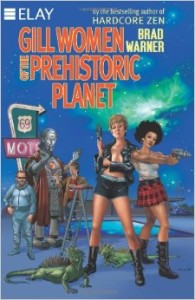 GILL WOMEN OF THE PREHISTORIC PLANET This is not a non-fiction Zen book/memoir like my other better known books, but a fictional novel. My intention was to write a science fiction novel. Whether it’s actually science fiction or not, I don’t really know myself. It takes place in Akron, Ohio in the 1990s and involves lots of people I knew in that place in those days. There are Zen themes running throughout the piece, but none of that is ever overtly stated. The main character is the kind of person I think I’d have been if I hadn’t discovered Zen practice. Also available as an audiobook.
GILL WOMEN OF THE PREHISTORIC PLANET This is not a non-fiction Zen book/memoir like my other better known books, but a fictional novel. My intention was to write a science fiction novel. Whether it’s actually science fiction or not, I don’t really know myself. It takes place in Akron, Ohio in the 1990s and involves lots of people I knew in that place in those days. There are Zen themes running throughout the piece, but none of that is ever overtly stated. The main character is the kind of person I think I’d have been if I hadn’t discovered Zen practice. Also available as an audiobook.
DEATH TO ALL MONSTERS This is another of my novels. It’s my first and concerns my work at Tsuburaya Productions and my life as an American ex-pat in Japan. Gudo Nishijima is a character in the story. It’s a fun and fast-paced comedic adventure novel with some X-Files-ish overtones. The Zen themes are, again, subtle. I had the idea that I’d write books that had just enough sci-fi elements to be accepted by readers of that genre while sneaking little bits of Zen past them.
EIJI TSUBURAYA: MASTER OF MONSTERS I did not write the main text of this book. That part is by August Ragone. But I did pretty much everything else. I conceived the idea, pitched it to Chronicle Books, sourced all of the photographs, wrote all the captions for the photos, cleared the rights for all of the photos (which included an amazingly unpleasant meeting with the LA-based representatives of Toho, the owners of Godzilla), commissioned most of the sidebars and fact-checked the text against Japanese written sources and by speaking directly to the actual people mentioned in the book. I also wrote two sections of the book, the one credited to me and the one credited to Akira Tsuburaya (I interviewed Akira and turned what he said into a first-person account as if Akira had written it himself). It’s the best book you’re gonna find in English about Eiji Tsuburaya, the creator of Godzilla, Mothra, Ghidorah, Ultraman and a host of other Japanese monstrosities.
NON-ZEN BOOKS
I AM THAT by Nisargadatta Maharaj. Nisargadatta Maharaj was just a guy in Mumbai who owned a little cigarette shop. In his 30’s he underwent a spiritual transformation, but instead of founding an ashram or an institution, he went back to his family and his shop. Eventually people heard about his experience and he would sit and talk with them in his apartment above the shop. Some of these talks were tape recorded and turned into this book. To me, Nisargadatta sometimes sounds like a modern-day Dogen, although he comes from a different tradition. I read this book three times all the way through. I’ve only ever done that with one other book, which was Shobogenzo.
THE TEACHINGS OF SRI RAMANA MAHARSHI by David Godman. Ramana Maharshi was a teacher of Advaita Vedanta, a non-dualistic movement in the Hindu tradition. All of his stuff is great, if you ask me. This is probably the easiest book of his teachings to start with if you’re unfamiliar.
CONSCIOUSNESS SPEAKS by Ramesh S. Balsekar. Ramesh Balsekar was a student of Nisargadatta Maharaj and also a teacher to Leonard Cohen. This is probably his most popular book, although he wrote a bunch of other books, which are also worth seeking out. He’s got an interesting take on the nature of reality that I found useful. I also recommend THE FINAL TRUTH by Balsekar.
ROBERT FRIPP: THE BOFFOMUNDO INTERVIEW 1979 by Ron Curtiss. Robert Fripp is the guitarist and one of the founding members of King Crimson. Although they’re often classified as “prog rock,” King Crimson have little in common with Yes, or Genesis, or Pink Floyd. Fripp was a student of J.G. Bennett, who was a student of Gudjieff. I know nearly nothing of the philosophies of Bennett and Gurdjieff, but much of the philosophical parts of this long interview with Fripp remind me of things my Zen teachers have said.
MONSTERS ARE ATTACKING TOKYO by Stuart Galbraith IV. This may be the best ever overview of Japanese monster movies and the people that made them. Galbraith traveled to Japan in the 1990’s and interviewed just about everyone involved in the industry. He stayed at my apartment for part of that time. I still feel bad that a mis-communication between us resulted in him having to sit out in front of my place for a few hours shivering in the cold.

